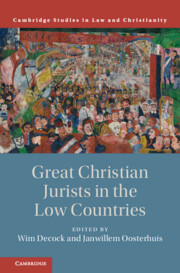Book contents
- Great Christian Jurists in the Low Countries
- Law and Christianity
- Great Christian Jurists in the Low Countries
- Copyright page
- Contents
- Contributors
- Introduction Law, Christianity, and Secularization in the Low Countries
- 1 Alger of Liège
- 2 Arnoldus Gheyloven
- 3 Boëtius Epo
- 4 Leonardus Lessius
- 5 Franciscus Zypaeus
- 6 Hugo Grotius
- 7 Paulus Voet
- 8 Ulrik Huber
- 9 Zeger-Bernard van Espen
- 10 Dionysius van der Keessel
- 11 Pieter Paulus
- 12 Guillaume Groen van Prinsterer
- 13 Edouard Ducpétiaux
- 14 Charles Périn
- 15 Léon de Lantsheere
- 16 Paul Scholten
- 17 Willem Duynstee
- 18 Jules Storme
- 19 Herman Dooyeweerd
- 20 Josse Mertens de Wilmars
- Index
- References
11 - Pieter Paulus
Published online by Cambridge University Press: 16 September 2021
- Great Christian Jurists in the Low Countries
- Law and Christianity
- Great Christian Jurists in the Low Countries
- Copyright page
- Contents
- Contributors
- Introduction Law, Christianity, and Secularization in the Low Countries
- 1 Alger of Liège
- 2 Arnoldus Gheyloven
- 3 Boëtius Epo
- 4 Leonardus Lessius
- 5 Franciscus Zypaeus
- 6 Hugo Grotius
- 7 Paulus Voet
- 8 Ulrik Huber
- 9 Zeger-Bernard van Espen
- 10 Dionysius van der Keessel
- 11 Pieter Paulus
- 12 Guillaume Groen van Prinsterer
- 13 Edouard Ducpétiaux
- 14 Charles Périn
- 15 Léon de Lantsheere
- 16 Paul Scholten
- 17 Willem Duynstee
- 18 Jules Storme
- 19 Herman Dooyeweerd
- 20 Josse Mertens de Wilmars
- Index
- References
Summary
Pieter Paulus was born 9 April 1753 at Axel, in the part of Zelandic Flanders which was governed by the States of the Province of Zeeland. It belonged to the Republic of the Seven Provinces, a confederation of Provinces, each of them governed by an Assembly of States, considered to be sovereign. The Provinces shared common institutions, representing the Republic as such. The most prominent was the assembly of the States-General, composed of representatives from all Provinces. A central political figure was the pensionary of the Province of Holland. Next to these, let us say, aristocratic institutions, the Republic also embodied a monarchical element in the person of the stadtholder. The incumbent was from the very beginning of the Republic a Prince of the house of Orange-Nassau. In 1747, the stadtholdership had become hereditary. The Republic had no official state church, although the Reformed Church enjoyed many privileges. Depending on local policies, Protestant dissenters (Mennonites, Lutherans, Remonstrants), Roman Catholics, and Jews, had in many but not all cases, freedom of worship.
- Type
- Chapter
- Information
- Great Christian Jurists in the Low Countries , pp. 201 - 218Publisher: Cambridge University PressPrint publication year: 2021

